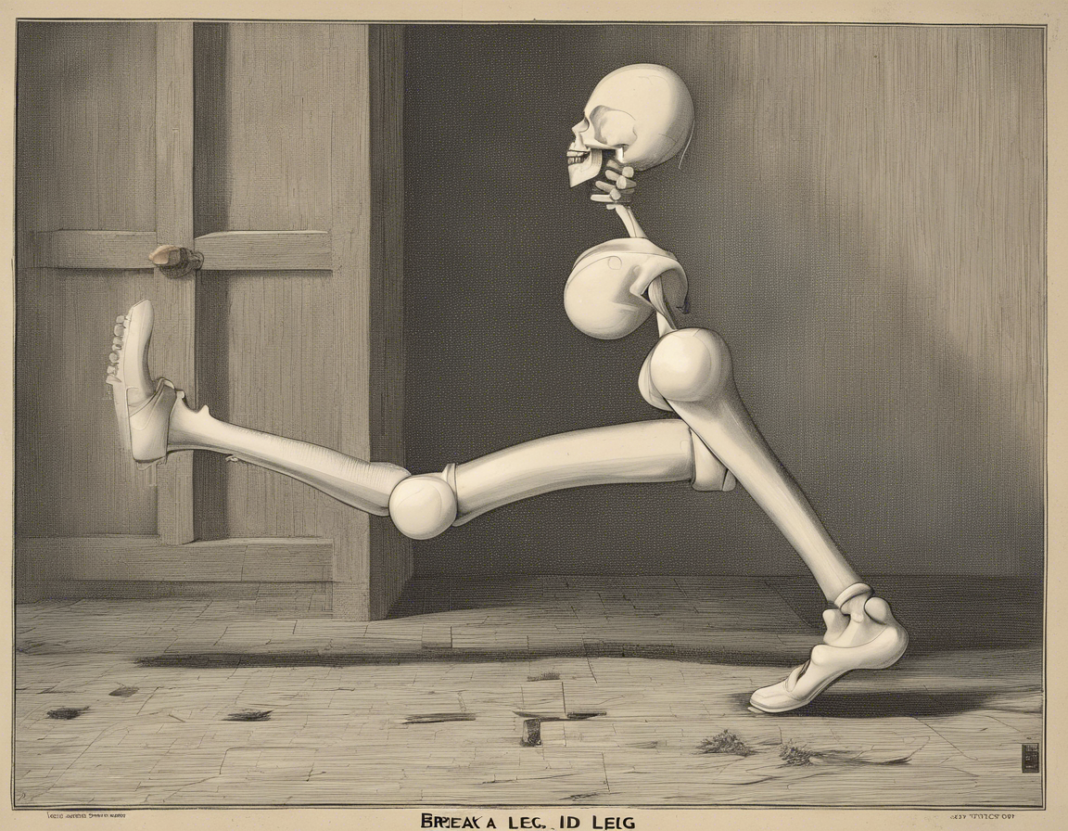Introduction
“Break a leg” is a phrase often heard in the world of theater and entertainment, typically used as a way to wish someone good luck before a performance or event. However, the origins of this unusual phrase are not immediately obvious and may leave some people puzzled. In this blog post, we will delve into the meaning of the “break a leg” idiom, explore its origins, and discuss its significance in the realm of performing arts.
What Does “Break a Leg” Really Mean?
The idiom “break a leg” is an expression commonly used to wish someone good luck before a performance, such as a play, musical, or any other event. Despite its seemingly negative connotation, the phrase is actually intended to be a positive and encouraging message rather than a literal suggestion to inflict harm upon oneself.
In theater circles, saying “break a leg” is believed to bring about the opposite effect—offering good luck and a successful performance. It is a form of superstition rooted in theatrical history and the idea that wishing someone good luck directly might have adverse effects.
Origins of the Phrase
The exact origin of the phrase “break a leg” is uncertain and has been the subject of much speculation and theories over the years. Some popular explanations include:
-
Evasion of the Evil Eye – One theory suggests that the phrase originated from attempts to avoid the “evil eye”, a curse that could befall performers. By deliberately saying something negative like “break a leg”, actors believed they could counteract any potential negative energy.
-
Bowing Legs – Another hypothesis links the phrase to the theater tradition of “bending” or “breaking” the legs when taking a bow after a successful performance. Therefore, wishing someone to “break a leg” could be seen as a way to signify the hope for a successful show.
-
Variation of an Irish Phrase – Some sources suggest that the phrase “break a leg” may have evolved from an Irish theatrical phrase “Blessings and good luck”. The phrase may have been altered over time to the more memorable and quirky form we know today.
-
Reverse Psychology – The use of “break a leg” could be a form of reverse psychology, where stating the opposite of what is desired is believed to bring about the desired outcome.
Context and Usage in Performance Art
While “break a leg” is traditionally associated with the theater, its usage has extended to other performance arts and even everyday life. From musicians before a concert to athletes before a big game, the phrase is often employed to offer encouragement and well-wishes.
In the theater world, actors, directors, and other personnel often use “break a leg” as a standard phrase before a show, as a way to show support and build camaraderie among peers. It has become a ritualistic part of the pre-performance process, symbolizing good fortune and a successful outcome.
Superstitions and Folklore in Theater
The theater has a rich history of superstitions and rituals, many of which date back centuries. These beliefs were developed as a way to ward off bad luck and ensure a smooth performance. Some common superstitions observed in the theater include:
-
“Break a Leg”: As discussed earlier, wishing someone to “break a leg” is a superstition intended to ward off bad luck and bring about a successful show.
-
Ghost Light: A light left on onstage overnight is believed to ward off mischievous spirits and bring good luck to the theater.
-
Whistling: Whistling backstage is considered bad luck as it is said to invite disaster onto the production.
-
Peacock Feathers: Bringing peacock feathers into a theater is seen as bad luck due to their association with evil spirits.
Common Misconceptions and Misinterpretations
Despite its ubiquitous use in the theater and entertainment industry, the phrase “break a leg” has sometimes been misinterpreted by individuals unfamiliar with its origins. Some common misconceptions include:
-
Violent Connotation: Some interpret “break a leg” literally and assume it carries a violent or negative undertone. In reality, the phrase is figurative and intended to wish someone good luck.
-
Cultural Confusion: In cultures where the phrase is unfamiliar, it may be taken at face value, leading to misunderstandings and confusion.
-
Negative Resonance: Individuals with limited knowledge of the phrase’s history may feel uncomfortable or offended by its usage, not understanding its positive intent.
FAQ Section
1. Is saying “break a leg” considered bad luck in any culture?
A: While the phrase “break a leg” is generally seen as a way to wish someone good luck in the theater, cultures that are unfamiliar with the phrase may perceive it as negative or bad luck.
2. Can “break a leg” be used in contexts outside of the entertainment industry?
A: Yes, the phrase has extended beyond the theater and is now commonly used to wish individuals good luck in various performance arts and even in everyday life.
3. Are there any other phrases similar to “break a leg” used in different cultures?
A: Various cultures have their own unique ways of wishing good luck, with some using phrases like “toi toi toi” in Central Europe or “Merde” in French-speaking countries.
4. How should one respond when someone says “break a leg” to them?
A: It is customary to respond to the well-wishes by saying “thank you” or a similar expression of gratitude.
5. Do actors and performers take the saying “break a leg” seriously?
A: While some may take it more seriously than others, the phrase is generally seen as a lighthearted and customary way of wishing good luck in the performance arts.
6. Are there any alternative theories about the origin of the phrase “break a leg”?
A: While the theories mentioned in this article are some of the most common, there are various other speculations about how the phrase “break a leg” came to be.
7. Is there a specific time when saying “break a leg” is most appropriate?
A: The phrase is typically used right before a performance or event where success is desired, making it a popular choice in the theater before shows.
8. Are there any countries or cultures where the phrase “break a leg” is considered offensive?
A: While it is mostly seen as a harmless expression of good luck, individuals from certain backgrounds or belief systems may perceive the phrase differently.
9. Does the length or intensity of the performance influence the use of “break a leg” as a good luck wish?
A: “Break a leg” can be used before performances of any length or scale, from brief recitals to lengthy plays or productions.
10. How has the popularity of the phrase “break a leg” evolved over time?
A: While its origins may be uncertain, the phrase “break a leg” has become a staple in the performance arts world and is now recognized and used by people outside the industry.
Conclusion
In conclusion, the idiom “break a leg” represents a fascinating aspect of theater culture and superstition, offering a unique insight into the quirky and endearing customs of the performing arts. While its origins may remain shrouded in mystery, its widespread usage and positive connotations have solidified its place as a beloved phrase in the world of entertainment. Next time you hear someone say “break a leg”, remember that beneath the surface, it’s a gesture of support and encouragement for a memorable and successful performance.









